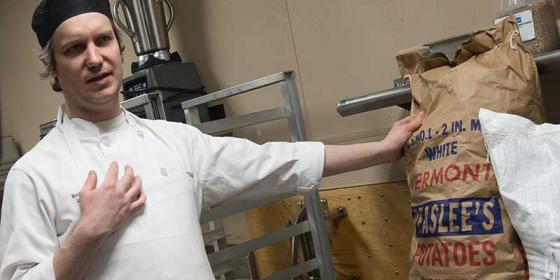Posted April 27, 2017 at 10:29am by Emily Portman
UVM Achieves 20 Percent 'Real Food' Served in Dining Halls, Sets New Goal

The University of Vermont announced on Monday the achievement of the Real Food Campus Commitment, a university pledge signed in 2012 to track and increase responsible food sourcing on campus. The university is meeting the 20 percent Real Food milestone three years early, having originally set out to meet this goal by 2020.
To build on this momentum, UVM has renewed its commitment with a new goal of 25 percent by 2020.
The Real Food Challenge is a nationwide student-led campaign to shift institutional purchasing to more sustainable and community-based food production. The national organization offers tools to audit university dining systems and support the procurement of qualifying products.
Food qualifies as “Real” if it meets requirements in one or more of the following categories: fair, ecologically sound, local, or humane. These qualifiers are developed by Real Food National Standards Council, and are used by all institutions that participate in the Real Food Challenge.
UVM has been a national leader for the Real Food Challenge since 2009, as one of the first schools to pilot the calculator tool that students use to audit university purchasing and determine the percentage that qualifies as Real. In 2012, UVM Interim President John Bramley signed the Real Food Campus Commitment, making UVM the fifth school in the country, and the first public land grant institution, to pledge to purchase 20 percent Real Food by 2020.
Nationwide, 80 colleges and universities have signed the Real Food Campus Commitment and well over 200 campuses utilize the calculator to track purchases in their dining systems.
Of these, only about a dozen have met or surpassed 20 percent, and UVM is the first land grant university to do so.
Tlaloc Vasquez, a Real Food Challenge National Organizer, believes UVM’s success is at least partially attributable to the fact that UVM’s contract with Sodexo, which runs UVM Dining, includes an obligation to meet the Real Food Campus Commitment. “The corresponding rapid pace by which the campus has shifted purchasing is notable.”
“UVM Dining is proud to be a partner in such a progressive campaign for food system reform,” said Emily Portman, sustainability coordinator for Sodexo. “We’ve been successful at creating a culture of transparency around food procurement and strengthening many of our local partnerships.”
Running concurrent to Real Food purchasing is UVM Dining’s Vermont First initiative, which supports local economies through the prioritization of products made in-state.
The combined success of value-based purchasing derives from the shared goals between students, administrators, dining services, and the nationwide platform.
“This achievement is a testament to the power of collaboration and student leadership. It’s been inspiring for me to watch the students pursue food system reform by researching products, auditing UVM purchases, and upholding momentum even when the project ran into roadblocks,” said Alison Nihart, assistant to the Food Systems Initiative at UVM.
“I joined the Real Food movement because I wanted to make a measurable impact on the food system,” say Gina Clithero says of her role as student co-chair for the multi-stakeholder Real Food Working Group. “It’s exciting to see that come to fruition.”
